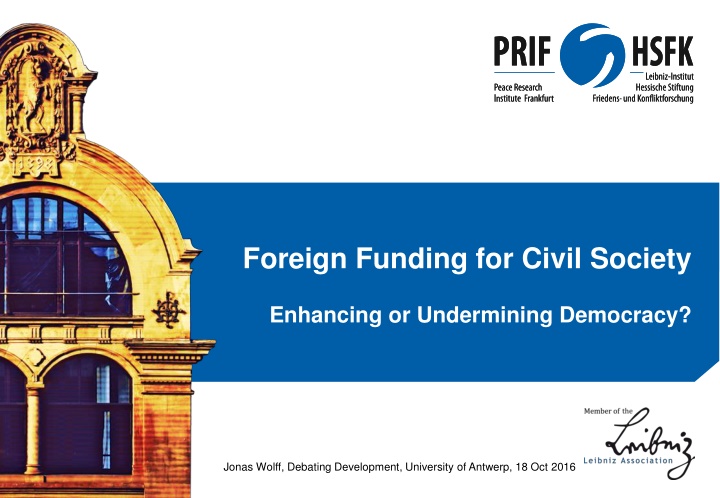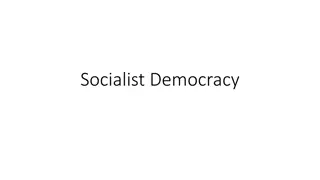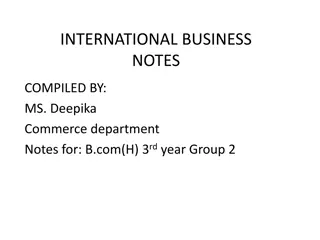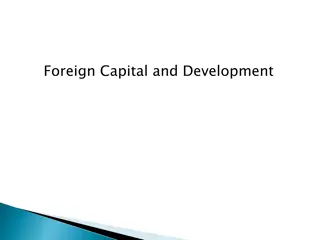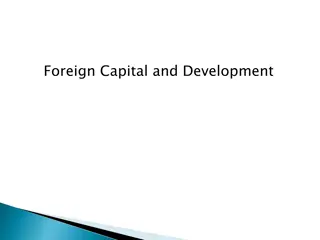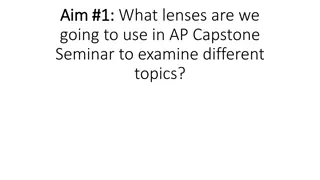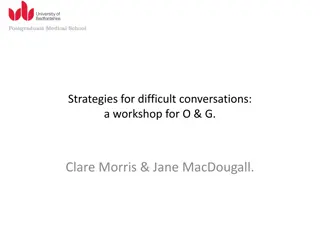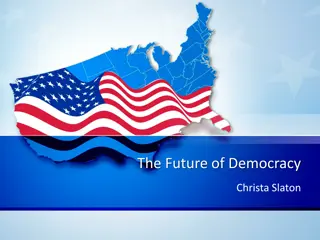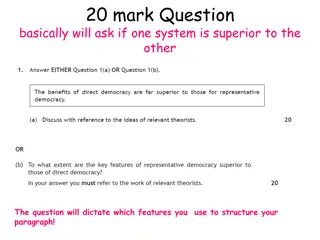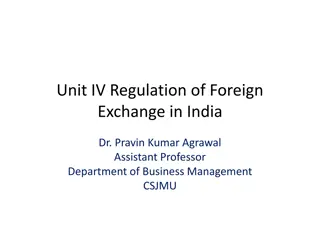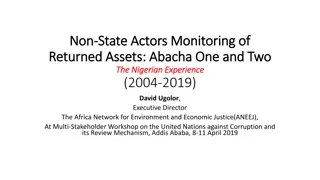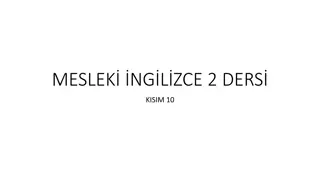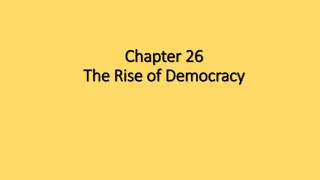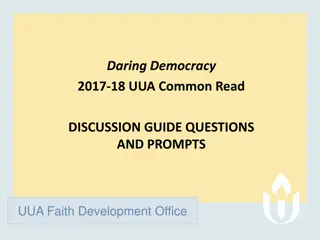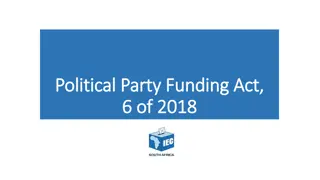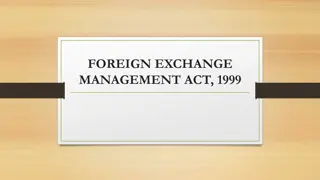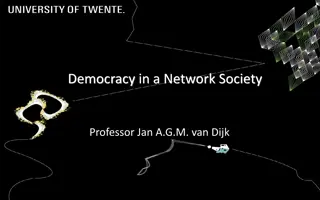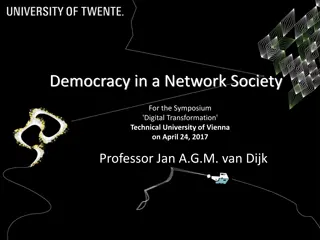Foreign Funding for Civil Society: Enhancing or Undermining Democracy?
The discussion revolves around the impact of foreign funding on civil society organizations (CSOs) and democracy. It explores legal restrictions, political targeting, and the trend of limiting foreign funding in approximately 50 countries since 2000. Various case studies from Bolivia, Egypt, Ethiopia, and India are presented to shed light on the complexities and challenges associated with foreign funding in the realm of civil society. The dynamics of domestic resistance and international contestation surrounding foreign funding are also examined.
Download Presentation

Please find below an Image/Link to download the presentation.
The content on the website is provided AS IS for your information and personal use only. It may not be sold, licensed, or shared on other websites without obtaining consent from the author.If you encounter any issues during the download, it is possible that the publisher has removed the file from their server.
You are allowed to download the files provided on this website for personal or commercial use, subject to the condition that they are used lawfully. All files are the property of their respective owners.
The content on the website is provided AS IS for your information and personal use only. It may not be sold, licensed, or shared on other websites without obtaining consent from the author.
E N D
Presentation Transcript
Foreign Funding for Civil Society Enhancing or Undermining Democracy? Jonas Wolff, Debating Development, University of Antwerp, 18 Oct 2016
Introduction Four stories: Bolivia, Egypt, Ethiopia, India Two main types of restrictions Legal restrictions on foreign funding (prohibition, limitation, regulation) Political targeting of foreign-funded CSOs and foreign organizations Contemporary trend of closing or shrinking space Since 2000, approx. 50 countries have tightened restrictions on foreign funding Part of broader shrinking space trend (domestic restrictions on civil society) Global trend: covers all world regions, all regime types maps 2 Foreign funding for civil society // Jonas Wolff // University of Antwerp // 18 October 2016
Dupuy/Ron/Prakash 2016 (World Development) 3 Foreign funding for civil society // Jonas Wolff // University of Antwerp // 18 October 2016
Christensen/Weinstein 2013 (Journal of Democracy) 4 Foreign funding for civil society // Jonas Wolff // University of Antwerp // 18 October 2016
Wolff/Poppe 2015 (PRIF Report) Legal Foreign Funding Restrictions on Civil Society Organizations (CSOs) Worldwide (compiled by Jana Baldus, selection) Country Foreign Funding Restrictions Applicable legislation Muslim religious organisations prohibited from receiving foreign funding 2015: Islamgesetz (Art. 6.2) Austria Burdensome reporting requirements related to political activities of charities (regarding amount of foreign funding) 2012: Budget 2012 Canada Prosecution of international groups that provide civil society support (2014 CSOs funded by European Economic Area- Norway NGO fund) [no specific legal basis] Hungary Restrictions on purpose of foreign funding (political purposes) 2001: Electoral (Amendment) Act Ireland Burdensome reporting requirements (regarding source, amount and purpose of foreign funding) 2011: Law on Disclosure Requirements for Recipients of Support from a Foreign State Entity 2015: more restrictive NGO bill passed by cabinet; approval by parliament pending Israel Registration of foreign-funded organizations involved in political activities as foreign agents; burdensome reporting requirements [1938 Law seldom applied; not applied to CSOs]; freezing of assets of at least seven US-based, Muslim charities [prosecution based on Anti-Terrorism legislation] 1938: Foreign Agents Registration Act (amendments: 1966, 1995) 2001: Executive Order 13224 and USA PATRIOT Act 2002: Anti-Terrorist Financing Guidelines: Voluntary Best Practices for US-Based Charities (Revised 2010) USA 5 Foreign funding for civil society // Jonas Wolff // University of Antwerp // 18 October 2016
Outline Foreign funding : What are we talking about? Domestic resistance to foreign funding: What are we to make of it? International contestation of foreign funding: What should be done? 6 Foreign funding for civil society // Jonas Wolff // University of Antwerp // 18 October 2016
Foreign funding in context The intrastate dimension: External support crucial for many CSOs, in particular in the global South Foreign funding restrictions key strategy for controlling/weakening civil society Closing space important element of recession / stagnation of democracy The international dimension: External civil society support key element in North-Western democracy promotion Embedded in asymmetric power relations and shaped by postcolonial legacies Closing space important element of backlash against democracy promotion Foreign funding not a technical issue, but highly political and relevant for the future of democracy and the international promotion of democracy and human rights! 7 Foreign funding for civil society // Jonas Wolff // University of Antwerp // 18 October 2016
Understanding resistance to foreign funding The liberal mainstream view: Restrictions by authoritarian governments, against opposition, to remain in power Restrictions undermine/prevent democracy Restrictions violate international (human rights) law (ICCPR) Claims to sovereignty/non-interference as illegitimate excuse (Maina Kiai) Key problems and blind spots with this view: Restrictions frequently receive broad (elite, popular) support Foreign funding undermines democracy (as collective self-determination) Non-interference/self-determination pillars of international of international law Complex clash of competing normative claims without clear-cut solution 8 Foreign funding for civil society // Jonas Wolff // University of Antwerp // 18 October 2016
Dealing with contestation of foreign funding States in the global South have good reasons to regulate civil society support Civil society as a key site of contestation/political struggle Experiences with North-Western paternalism, exploitation and intervention Normative claims to non-interference and collective self-determination Foreign funding issue has no clear-cut solutions All sides make valid normative claims Problem of multiple domination (Rainer Forst) in the contemporary world Competing conceptions of civil society, democracy, and political development Acknowledge the general legitimacy of civil society support restrictions Differentiate between restrictions on domestic CSOs and foreign funding Focus on how (not if ) of restrictions: how specifically prevent political meddling? 9 Foreign funding for civil society // Jonas Wolff // University of Antwerp // 18 October 2016
Thank you for your attention comments & questions: wolff@hsfk.de Jonas Wolff, Debating Development, University of Antwerp, 18 Oct 2016
